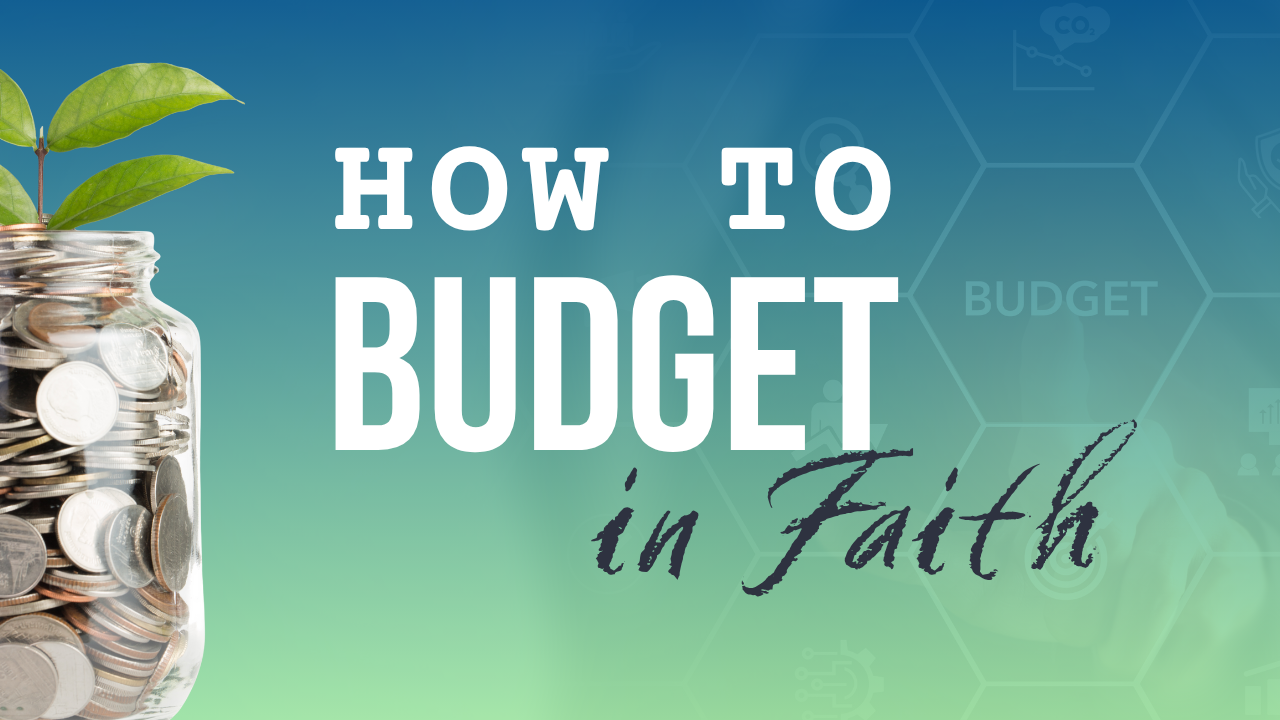How to Budget in Faith
Aug 10, 2025
Written by Renate McDonald
In the previous post, I spoke about Budgeting: An Act of Faith. I shared the principles and Scriptures that bring out the points. If you haven't read that one yet, I encourage you to check it out.
In this post, I will be focusing on the practical side of things - how do you put into action the concept of creating a budget in faith? Let's jump right in!
"Show me your faith apart from your works, and I will show you my faith by my works."
~ James 2:15 ESV ~
Budgeting is essentially making a plan for the money that you manage. You may do this before the money comes under your care (recommended) or after. Either way, the idea is to work out where each dollar will go before you begin spending.
While there are many different ways to budget, for the purposes of this blog, I will be using the "zero balance" method which says:
Income - Expenses = 0
This method ensures that every dollar is accounted for. I will also be assuming a monthly budgeting cycle (though the principles can apply to any cycle you choose).
Step 1: Pray
"If any of you lacks wisdom, let him ask God, who gives generously to all without reproach, and it will be given him."
~ James 1:5 ESV ~
Before jumping into a budgeting session, take some time to seek the Lord on where He want you to focus the finances that He has entrusted to you. Some things may be quite obvious but others, not so much. You may be surprised at how He leads you. The aim here is to align your budget and your actions with God's will and plan for you.
Here are a few guiding points to help you get started, especially if this is new to you:
- Thank God for His provision
- Commit yourself and the finances to Him
- Ask God to give you wisdom, discernment, clarity and courage to follow through
- Ask God what goals you should be pursuing for the budgeting period
- Seek His peace for the process (financial matters sometimes breed anxiety)
Step 2: Clarify Your Goals
"Many are the plans in the mind of a man, but it is the purpose of the Lord that will stand."
~ Proverbs 19:21 ESV ~
A budget should be aligned with your goals, and yes, "getting through the month" is still a goal, though it's not a well-defined one. Following on from your prayer, you may have received some instructions from the Lord regarding your spending. Be sure to factor those into your plans.
Write down what you are aiming to accomplish as a reminder of why you are making the decisions reflected in your budget.
A goal may extend beyond the duration of the budget but how you allocate funds now will affect your ability to accomplish that goal later. For example, if paying for a semester of school in August 2026 is a goal, and you are preparing your budget for September 2025, you could start setting aside funds now towards your August 2026 goal.
Step 3: Project Your Income
"The plans of the diligent lead surely to abundance, but everyone who is hasty comes only to poverty."
~ Proverbs 21:5 ESV ~
If you are employed with a consistent salary, this is a straightforward step. However, if you are not, and you have inconsistent income, then this step will require you to estimate what you will have come in for the month using historical information (what has happened in the previous months) or expected income from agreements, jobs, etc.
Include all your streams of income and total the amount to reflect your projected income for the budgeting period.
Step 4: Factor in Your Tithe
“But woe to you Pharisees! For you tithe mint and rue and every herb, and neglect justice and the love of God. These you ought to have done, without neglecting the others."
~ Luke 11:42 ESV ~
Your tithe is an important part of honouring God first. When budgeting, remember to factor in your tithe before you start allocating funds to your expenses. Prepare your budget with the amount that remains after your tithe.
Step 5: Estimate Your Expenses
"For which of you, desiring to build a tower, does not first sit down and count the cost, whether he has enough to complete it?"
~ Luke 14:28 ESV ~
The rule of thumb I use here is to average what I actually spent over the past three months in each category of expenditure to provide an estimate for the coming month. There are typically more lines of expenses than of income, which means that it is important to pay attention to the various line items.
When it comes to expenses:
- Outline all areas of expense, line-by-line. For example, instead of just listing "food", you can break that down into groceries, market and eating out.
- Be realistic in your estimates - use as much real data as possible to fill in the budget column. For example, average the electricity bill for the past 3 months and use that figure to estimate the amount for the coming month.
- Remember to include any relevant one-off expenses that may occur during the upcoming period - school fees, car insurance, cooking gas refills, etc.
Step 6: Work Towards A Zero Balance
With all your income and expense lines filled in, you can now calculate the totals and identify any gaps. Most people do not have a zero balance on their first go at their budget for the period, so don't worry.
If you have a positive difference between income and expenditure, allocate those funds to a line item like debt reduction, savings or investments.
If you have a negative balance, then go over your expenses line-by-line to see if it is possible to reduce some of your planned expenses for the period. If you are unable to reduce your expenses enough to get to a zero balance, then you may need to explore an additional income stream to close the gap.
This is usually where anxiety creeps in for many people - the point where the numbers don't balance. But remember,
"...do not be anxious about anything, but in everything by prayer and supplication with thanksgiving let your requests be made known to God."
~ Philippians 4:6 ESV ~
Seek the Lord's guidance on how best to close the gap. Do not allow anxiety to take over. Rest in the surety of God's provision.
[Bonus] Step 7: Track Your Expenses
After you have created your budget, the next important step is to keep track of your actual expenses throughout the month. This way you will know if your budget was realistic or not. Your actual expenses will guide you in preparing your budget moving forward.
It is my prayer that this article has shed some light on the budgeting process for you. It is more than just listing your expenses on paper. Your budget should reflect and encourage your faith. It should remind you of your Source (God) and your role as steward. It should elevate your prayers from only seeking provision to seeking purpose.
If you are ready to take the step of budgeting in faith, download our FREE Budgeting Guide and get started today.

